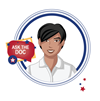Dear Doc: I suffer from horrible allergies every year and I've just changed duty stations to an area that I've been told is especially bad for them in the spring. I've tried over-the-counter meds for years and nothing seems to work. With things starting to bloom, I'm almost afraid to go outside. How can I keep my allergies in check and make sure I can finally enjoy the warm weather in the next few months?
— My Nose Knows (and so do my eyes and throat)

Dear Nose: You’re not the only one who suffers from allergies. I’ve had a few rough springs myself.
There are several ways to minimize the effects of springtime allergies. The easiest thing to do would be to stay inside, but that’s obviously not ideal. Not to mention, winter coupled with COVID-19 has had us doing a lot of that lately.
I recently talked to Air Force Lt. Col. (Dr.) Karla Adams, medical director for allergy services at Wilford Hall Ambulatory Surgical Center at Lackland Air Force Base in Texas. She had quite a bit of good advice about what you, as well as your nearest military treatment facility, may be able to do to make your spring a little more enjoyable.
Allergies to pollens and environmental allergens are pretty common. Some folks can suffer from year-round allergies and other people are very much seasonal in terms of their pattern of allergies, and it’s going to depend on what’s blooming and the individual and what they’re allergic to, as well as their location.
Like I said, we know that this is common and, as a matter of fact, allergies are increasing in the general population. Our goal is to try to prevent symptoms as well as treat symptoms in several different ways. There are a few things you can do.
Try to limit your time outdoors during peak allergy season. If you can stay inside, obviously that’s going to help. I realize it’s not ideal for everyone to be indoors all the time, so you might think about changing the way you would normally do things. For instance, windy days tend to be worse for outside allergens because pollens are getting stirred up in the air. Given that, you can easily determine that a windy day during peak allergy season is probably not the best day to be outside.
If you know what pollens you’re sensitive to, there are several ways to check pollen counts wherever you live. There’s an organization called the National Allergy Bureau that has an online tool that allows you to type in your ZIP code and find out what pollens are in the air, and many local newspapers and television stations also report on pollen counts. It’s really all about keeping yourself informed.
You can also tailor when you’re going outside. We know, for example, when and where ragweed pollen is really high, it tends to be higher in the morning. Conversely, tree pollen tends to be higher in the evening.
Other practical tips include wearing protective eyewear to prevent allergens from getting in your eyes. If you know that mowing the lawn is a trigger for you, wearing a mask while you’re doing that activity can help.
It’s unrealistic to never go outdoors. We must go to work, school, things like that. Taking precautions like shutting the windows, changing your clothes, washing your hair, or taking a shower after coming inside can help to minimize bringing those pollens into the house. HEPA (high efficiency particulate air) filters in your vacuum or air conditioner, or stand-alone HEPA filters can help quite a bit to filter those things out, too.
Allergy medications can help, but there’s a difference between over-the-counter and prescription medicine. All the medicines are designed to treat symptoms, but some are better at preventing versus treating acute symptoms. Nasal sprays, for example, do a better job at preventing symptoms from developing in the first place. The key is to start medication one to two weeks before your peak allergy season. If you wait until the symptoms start, it’s going to be harder to treat.
Knowing which medications work for you and talking to your primary care provider can help to find a good medication profile to help you get better.
If over-the-counter or prescription medications aren’t working, allergy shots are also definitely an option. Allergists can provide allergy shots for patients who have failed treatment with other measures. It’s a long process (three to five years), but it’s the one tool that we have that’s disease-modifying, meaning that we can make your allergies either better or, sometimes, completely go away.
One question that I get sometimes is, “Can I move to a location that doesn’t have allergens, so my allergies won’t affect me as much?”
Unfortunately, allergens are present pretty much everywhere. You might have different patterns depending on location, but a lot of it is understanding what your triggers are and finding out what works for you, whether that be avoidance measures or medication.
Nose, I hope this advice helps and you’re able to get out there and enjoy the area around your new duty station as the weather warms up. I know I intend to get outside in as much as possible.
It’s all about finding a treatment that works for you, whether that be medication, taking precautions, a mix of both or even allergy shots. The first thing I would do if I were you (if you haven’t already) would be to go talk to my primary care physician. They should be able to help you figure out the best course of action.
Keeping you healthy and mission ready is what we’re here for.
Until next time…take care out there!
–Doc